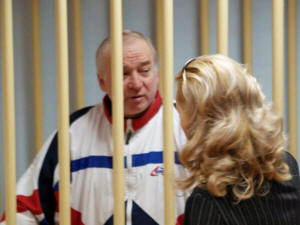|
British PM May weighs response to attack
on former Russian double agent
 Send a link to a friend
Send a link to a friend
 [March 12, 2018]
By Guy Faulconbridge and Michael Holden [March 12, 2018]
By Guy Faulconbridge and Michael Holden
LONDON (Reuters) - Prime Minister Theresa
May will chair a meeting of Britain's National Security Council on
Monday to weigh how to respond to a nerve agent attack on a former
Russian spy who passed secrets to British intelligence.
Sergei Skripal, 66, and his daughter Yulia, 33, have been in hospital in
a critical condition since March 4 when they were found unconscious on a
bench outside a shopping center in the southern English cathedral city
of Salisbury.
May has warned that if Russia was behind the poisoning of Skripal, a
former colonel in GRU military intelligence, then Britain will respond
robustly. Russia has repeatedly denied any involvement in the attack.
The chairman of the British parliament's foreign affairs committee, Tom
Tugendhat, said the attack looked like state-sponsored attempted murder
and he expected May to blame Moscow.
"Frankly I would be surprised if she did not point the finger at the
Kremlin," Tugendhat told BBC radio.
He said Russia's so-called oligarchs, who amassed fortunes as the Soviet
Union crumbled and during President Vladimir Putin's 18-year rule of
Russia, should be denied entry to the luxuries of London and the West.

British counter-terrorism police say a nerve agent - usually a small
molecule based on phosphorus that interferes with the transmission of
nerve signals - was used on Skripal and his daughter. But they have
refused to specify which poison was used.
"LONDONGRAD"
If Russia is publicly accused of carrying out the attack, it would send
already strained relations between London and Moscow to a new post-Cold
War low, with potential repercussions for some Russian money in Britain.
The Russian Foreign Ministry says London is whipping up anti-Russian
hysteria.
The British capital has been dubbed "Londongrad" due to the large
quantities of Russian money that have poured in since the collapse of
the Soviet Union in 1991.
May last year said Putin was seeking to undermine the West and the
international order by meddling in elections. She promised to ensure
corrupt money does not flow into Britain from Russia.
Putin, who took over as Kremlin chief from Boris Yeltsin on the last day
of 1999, has denied allegations that Russia meddled in the 2016 U.S.
presidential election and says the West has repeatedly tried to
undermine Russian interests.
Skripal betrayed dozens of Russian agents to British intelligence before
his arrest in Moscow in 2004. He was sentenced to 13 years in prison in
2006, and in 2010 was given refuge in Britain after being exchanged for
Russian spies.
[to top of second column]
|

Sergei Skripal, a former colonel of Russia's GRU military
intelligence service, looks on inside the defendants' cage as he
attends a hearing at the Moscow military district court, Russia.
Kommersant/Yuri Senatorov via REUTERS

British Foreign Secretary Boris Johnson also drew parallels between
the poisoning of Skripal and the murder of former KGB agent
Alexander Litvinenko, who died in London in 2006 after drinking
green tea laced with radioactive polonium-210.
"BABY WIPES"
A British public inquiry found the killing of Litvinenko had
probably been approved by Putin and carried out by two Russians,
Dmitry Kovtun and Andrei Lugovoy - a former KGB bodyguard who later
became a member of the Russian parliament.
Both denied responsibility, as did Moscow.
After Skripal was found slumped on a bench in Salisbury, health
officials in Britain said there was no wider risk to public health.
But some police investigators wore full chemical and biological
suits and the army was later deployed to help remove items from the
scene.
On Sunday, hundreds of people who visited the city's Zizzi
restaurant or the Bishop's Mill pub were told to wash their clothes
after traces of the substance used to attack Skripal were found at
both sites.
Jenny Harries, deputy medical director at Public Health England,
suggested there may be a very small health risk associated with
repeated contact with belongings that may have been contaminated.
"Wipe personal items such as phones, handbags and other electronic
items with cleansing or baby wipes and dispose of the wipes in the
bin," Harries suggested. "Wash other items such as jewellery and
spectacles which cannot go in the washing machine with warm water
and detergent."
(Editing by Kevin Liffey)
[© 2018 Thomson Reuters. All rights
reserved.]
Copyright 2018 Reuters. All rights reserved. This material may not be published,
broadcast, rewritten or redistributed.
Thompson Reuters is solely responsible for this content.
 |